SURVEYORS

EDUCATION AND THE PROFESSION














As my term as President of the SCSI comes to a close, I’ve taken time to reflect on what has been a rewarding and energising journey. It has truly been an honour and a privilege to represent such a vibrant, committed, and forward-looking community of professionals.
Throughout the year, one theme has remained consistently at the heart of everything we do: education. I have witnessed firsthand the profound role that education plays in shaping the future of our profession. From school leavers and APC candidates to experienced members undertaking CPD, it’s clear that continuous learning is the cornerstone of a strong, resilient surveying industry.
One of the most meaningful initiatives I was proud to champion was the promotion of surveying as a viable and exciting career path for school students. We have a responsibility to ensure that young people see beyond the traditional CAO routes, and recognise that surveying offers not just stability, but purpose — the chance to shape safer, more sustainable, and more inclusive communities.
To address the skills shortages we face, we must continue to expand and support accessible entry pathways such as apprenticeships, postgraduate conversion courses, and more flexible learning models. These programmes are not just a pipeline for talent — they are lifelines for inclusion and equity, especially for those who may not otherwise see a
Kevin Hollingsworth SCSI President
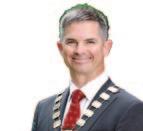
place for themselves in the built environment sector. I am incredibly proud of the progress we’ve made in this area, but there is still much to do. As a profession, we must stay focused on building a broader, more diverse cohort of future surveyors — not just to meet demand, but to ensure that the values and insights of all parts of our society are reflected in how we shape our world.
Passion and authenticity
None of this would have been possible without the support, energy, and commitment of so many people. I want to express my heartfelt thanks to the SCSI education team, and in particular to the members of the Nexus Committee. Their enthusiasm and generosity in volunteering to visit schools with me, engage with students, and share their own stories has been truly inspiring. Only recently, at a Transition Year event jointly organised by TU Dublin and the SCSI, it was fantastic to see so many Nexus members speaking to students with passion and authenticity. They are a credit to our profession and a powerful reminder that the future of surveying is in excellent hands. As I hand over the chain of office, I do so with immense pride and optimism. I have no doubt that the SCSI will continue to grow and evolve, driven by a membership that cares deeply about the work we do and the impact we make.
Thank you for the opportunity to serve. I look forward to watching – and supporting – the next generation as they rise to meet the challenges and opportunities ahead.
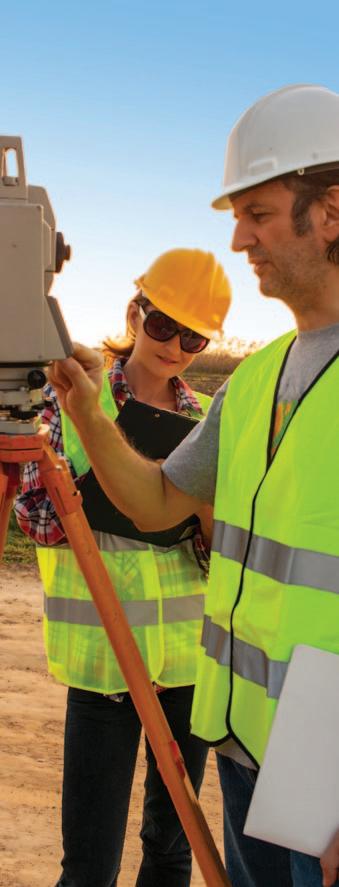
THIS SPECIAL EDITION FOCUSES ON THE SCSI’S INVOLVEMENT IN EDUCATING THE PROFESSION.
This special edition of the Surveyors Journal focuses on education and will allow members to update themselves on developments in the SCSI’s extensive involvement in education. Surveying offers diverse career options, perhaps more than other professions, and there is not one generic educational programme that will lead to a surveying career, as is the case with law for example. Consequently, the means to gain entry to the profession in all its varieties, and to rise to full professional status, must match this range of professional disciplines. Reflecting this, there are increasingly diverse routes to education for the profession and a wide variety of programmes and courses are now accredited throughout the country. Also of interest will be reading about the background activities supporting the educational functions of the Society, and the reflections of members on past and possible future developments in education.
The Society’s involvement in education is a crucial element of its activities. Kevin Hollingsworth says that during his year as President, he witnessed the profound role that education plays in shaping the future of the profession. He also says that to address skills shortages, the SCSI must continue to expand and support the accessible entry pathways that have emerged in recent years. These varied entry pathways match the diversity of disciplines and are, as Kevin puts very well, not just a pipeline for talent: they are lifelines for inclusion.
Turning to other SCSI affairs, nominations for roles on committees, professional groups and the SCSI Board open on Wednesday, April 23. I can say from personal experience, and also from the testimony I have heard for many years from those who engaged with the Society, that involvement in its affairs is rewarding and offers a dimension to career development that is much valued on a personal level also. The Editorial Board of this Journal is also seeking new members who would be interested in contributing to its work, and you can find out more about this on page 24.
Returning to the diversity of surveying, this is splendidly illustrated by the feature titled ‘Space, satellites and surveying’ (p.14) This tells of a collaborative project dedicated to fostering an interest in spatial data, satellite technology, and geospatial science among students and teachers. Surveying is very interesting indeed.
Tom Dunne Editor

EMPLOYMENT, SUPPLY AND DEMAND IN IRISH SURVEYING
Percentage of surveying firms likely or very likely to employ an apprentice 57%
Median salary across surveying disciplines
€77,199
Percentage of surveyors currently working on a hybrid basis
61%
Projected supply of surveyors based on graduate numbers
1,829
Median projected demand for surveyors based on survey responses
2,162
Source: SCSI Employment, Remuneration and Workplace Report 2023 – https://scsi.ie/employment-remuneration-workplace-report-2023/
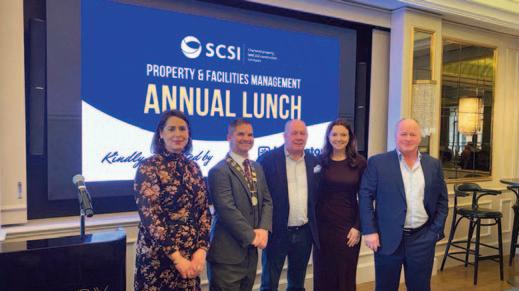
It was fantastic to come together with over 100 property and facilities management professionals at our annual lunch. It was a great opportunity for networking and insightful conversations, and featured a wonderful interview with Republic of Ireland soccer legend Liam Brady. Our thanks to everyone who attended and special thanks to Burlington Engineering for its continued support.

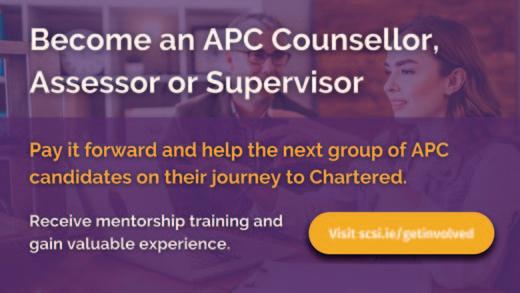
Take the next step in your career and support the next generation of Chartered Surveyors by becoming an APC Counsellor, Supervisor or Assessor.
Receive training and connect with other professionals helping to support candidates on their journey to chartership.
Visit scsi.ie/getinvolved or contact Ruth Comerford Morris at ruth@scsi.ie
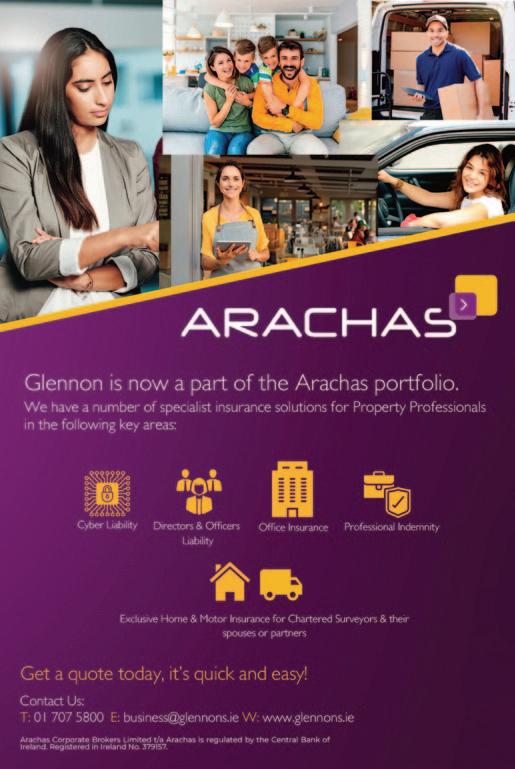
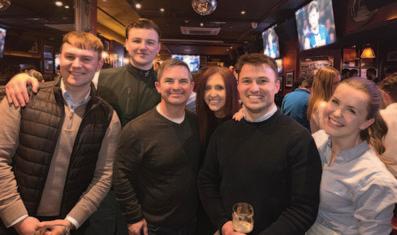
A full house of enthusiastic young surveyors recently turned out for our soldout Nexus Table Quiz. Congratulations to the winning team from Avison Young Ireland and the runners-up from Bannon. A special thank you to Colliers for its generous support of this year’s event, and to everyone who participated, making it a memorable and competitive evening.
Wondering about Nexus? Nexus is the SCSI’s young professional network. To find out more, visit scsi.ie/nexus.
We now look ahead to the 2025 Nexus tag rugby and soccer tournaments. If you are interested in supporting a Nexus event, visit scsi.ie/sponsor or contact our events team at events@scsi.ie
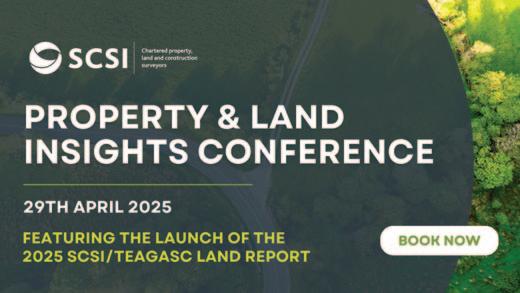
Join us for the 2025 SCSI Property & Land Insights Conference, a must-attend hybrid event on Tuesday, April 29, at 38 Merrion Square from 9.30am-3.30pm.
This full-day conference will provide in-depth insights into the latest trends shaping the property market, address key industry challenges, and feature the ‘SCSI/Teagasc Land Report 2025’ launch. Connect with professionals shaping the future of property and land in Ireland. Tickets on sale now at scsi.ie

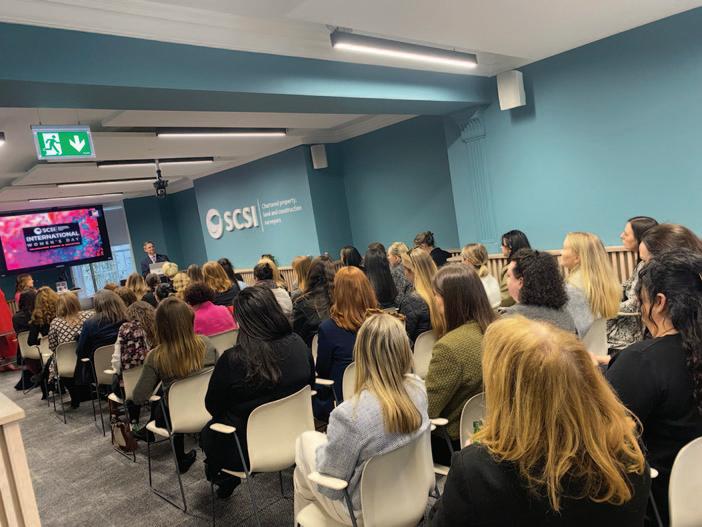
We were delighted to welcome 90 members, both in person and online, for our annual International Women’s Day event, celebrating the contributions and achievements of women in surveying. The afternoon featured an engaging discussion with panellists Anya Llewellyn, Marian Walsh, and Lily Ellis, alongside our guest speaker Alison Cowzer, who shared insights on leadership and professional growth.
A highlight of the event was the official launch of the 2025 Elevate Programme, an initiative dedicated to supporting women in surveying through leadership development training and mentorship. This programme aims to equip participants with the skills and guidance needed to advance their careers and drive meaningful change within the profession. Our thanks to all who took part in this year’s event.
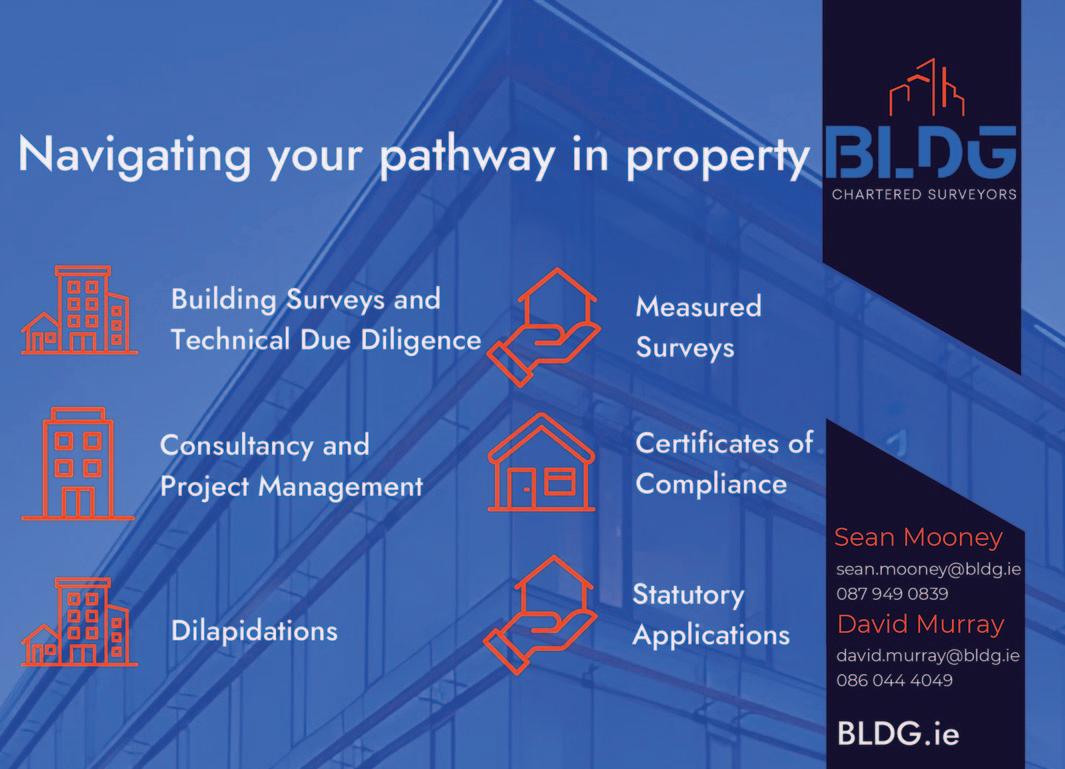
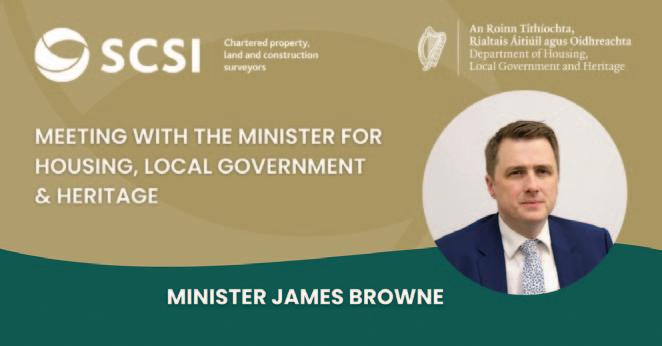
The new Programme for Government highlights housing as a central priority that will require strong leadership from the Minister for Housing, Local Government and Heritage, James Browne TD. A delegation from the SCSI recently met with new Minister, and SCSI President Kevin Hollingsworth and CEO Shirley Coulter shared the Society’s commitment to
providing independent, expert insights from the surveying profession in the public interest.
Minister Browne, already having a familiarity with the SCSI’s work, including our ‘Real Cost’ series of reports, expressed strong interest in our schedule of upcoming data-led publications. The productive conversation marks the start of what is expected to be a
collaborative effort with Government and opposition stakeholders alike, aiming to tackle the pressing challenges in the housing sector. The SCSI looks forward to continuing these vital discussions and contributing to the policy dialogue surrounding housing and related issues for the construction, land and property sector.

Grow your career and impact by nominating yourself for a role on a regional committee, professional group, standing committee, or the SCSI Board.
Opportunities to get involved
n Join a regional committee: expand your local business network and make meaningful industry connections;
n join a professional group: grow your career and shape the future of your profession;
n lead on a standing committee: impart your vision, grow member services, and shape the Society; or,
n lead as a member of the SCSI Board: raise your public and professional profile while you propel the SCSI forward.

Whether you are a current member of an outgoing committee, a volunteer looking to get involved once again, or unsure of where to start, you have an important role to play and contribution to make.
Nominations open on Wednesday, April 23. To find out more, visit scsi.ie/nominations.
The Building Consultancy has been appointed to provide architectural design services for Jacobs Engineering’s new Cork office at Navigation Square, Cork City. The Building Consultancy states that it will be working with Roccul, the main contractor, to deliver the 14,000sq ft office fit-out, scheduled for completion by the end of July 2025.

Quantity surveyors
Land Development Agency


Job description: The Land Development Agency currently has exciting opportunities for Quantity Surveyors to join its cost management team to support the development of the LDA’s extensive development pipeline.
Contact: LDA recruitment team at recruitment@lda.ie.
Deadline for applications: November 4, 2025
For further information on each of the opportunities available, please see the LDA's Careers Page.
SURVEYING EDUCATION HAS CHANGED MASSIVELY OVER RECENT DECADES AND WILL CONTINUE TO DO SO. HERE WE SPEAK TO THREE OF IRELAND’S LEADING SURVEYING EDUCATORS ABOUT THE CHANGES THEY’VE SEEN AND WHERE THINGS MAY GO IN THE FUTURE.
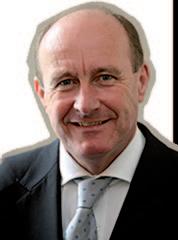
Tom Dunne, former Head of School of Surveying and Construction Management, TU Dublin
Tom spent decades teaching in various iterations of what is now TU Dublin, eventually retiring as Head of School of Surveying and Construction Management, and says: “When I joined Bolton Street in 1982, it was the only provider of degree-level surveying education in the country”.
There were just three degree-level programmes: quantity surveying, valuation surveying, and geo surveying. At that time there were few surveyors in Ireland, and professional exams were run by professional bodies: “A big transformation in the years before I joined was the recognition of these degrees by the RICS. Although the RICS continued to run exams, more and more surveying became a graduate-entry profession”.
Colm Quinn Senior Journalist, Think Media Ltd

RICS recognition was hugely important, as it meant that graduates were internationally recognised and could travel abroad: “That was very important, particularly at the time in the 80s when there were high levels of emigration”.
There were not many educational resources for surveying students when Tom started, with few textbooks: “Therefore, a large part of what one was doing as an educator was providing students with original material that they could work on”.
In his early years, Tom says it was important for students to have a solid mathematical capacity: “Nowadays, that can be compensated for by the technologies that are available”.
Education now is more about research orientation and developing skills, says Tom: “How to handle information and how to handle the technologies now widespread in the industry, IT technologies, particularly a capacity for financial calculations, apply to all aspects of the profession”.
In terms of a surprising change Tom has seen, or rather one he hasn’t seen, he says he thought that by now the profession would be less male dominated. There are various roles available in surveying and no matter a student’s aptitudes or gender there is a niche in surveying to suit them: “In the 1980s you would have thought that given the roles that are
“
THE TECHNICAL SKILLS AND KNOWLEDGE REQUIRED CAN BE LEARNED BUT OFTEN PEOPLE ACHIEVE MORE BECAUSE THEY HAVE HUMAN TRAITS THAT ALLOW THEM TO SUCCEED.
available in the profession and the nature of those roles, it would be attractive to all, both men and women. That’s not what turned out. It’s one of those things that points to how some things in society just endure, often for no good reason. It’s tradition. I don’t quite know what it is, but it’s something that I find a bit surprising. I would have thought by now that the balance of females to males in the profession would be more towards 50/50 than it is”.
When it comes to the traits a surveyor or surveying student needs, Tom believes human skills are most important: “Often in surveying, the work is focused on working with other parties, in dispute resolution, or working as part of a team. The technical skills and knowledge required can be learned but often people achieve more because they have human traits that allow them to succeed. Probably those human traits would allow them to prosper in other professions as well. But I think they’re particularly important in surveying”.
Collaboration between professional bodies and third-level institutions is valuable, but Tom believes it is equally important for the independence of both to be maintained. Professional bodies need to be able to assess independently if a degree programme produces graduates who have the skills needed for industry: “I think that’s crucial. So, yes to collaboration and yes to constructive work on both sides, but at the end of the day, there are two separate roles”.
Tom says the ability to think critically is huge for surveyors: “What do I mean by that? It means the ability to make reasoned judgements from a rational evaluation or consideration of all the available evidence after doing a required level of research”.
At the end of this process, the ability to stand back and evaluate your work and question if you are correct is very important to instil in surveying students: “That is not an ability that is necessarily innate. It is something that has to be developed. The capacity to think critically is perhaps the most important ability that one has to develop as a professional person”.
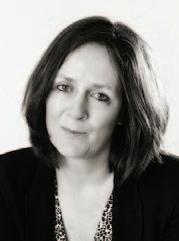
Dr Niamh O’Reilly, Chartered Geomatics Surveyor and lecturer in TU Dublin
Following graduation from Bolton St in the late 80s, Niamh worked in Ireland, the UK and US before coming back to DIT Bolton Street to lecture. She was the first female Chartered Geomatics Surveyor in Ireland, completed a master’s in Geographic Information Science (GIS) at the University of Huddersfield, and more recently received her doctorate, which evaluated road safety for cyclists in Dublin using geospatial solutions.
Over her years teaching, Niamh says surveying education has seen huge changes: “The technology has completely evolved. In geomatic surveying, we’ve always been ahead of the posse when it comes to embracing new technologies, including GNSS, laser scanners, and drones to gather spatial information. We use sophisticated surveying software packages, GIS, 3D modelling, big data analytics to process and manage spatial data that is essential for informing evidence-based decisions for resource planning, smart cities and disaster management. The capabilities of computers enable us to process and analyse information in ways that couldn’t possibly have been envisaged back when I started”. What Niamh tries to teach students is to use all data available from many sources, such as drones, laser scanning and Earth observation satellites, and dig deep into it: “What we’re really emphasising is for our students to look at how we can bring more meaning out of the data. And because it’s geospatial, it has the advantage that we can combine lots of different layers of information together to get far more insight”. The pace of change has been surprising given the rate of development of emerging technologies, says Niamh: “I think the big thing is BIM, and we talk about this geospatial infrastructure where it’s bringing everything together. So you have your architects, quantity surveyors and engineers working together on the design and development of buildings. But at the end of the day, you need to bring that into the real world, and that’s where geomatic skills come in”.
It has been difficult to attract students into geomatics surveying, and Niamh attributes this to a lack of understanding of what geomatics surveyors do: “We’ve really had to dig hard and think about how we can attract more students… Currently we’re developing a geomatics apprenticeship programme that will give school leavers the opportunity to work in a surveying company and study in blocks of time over the year”.
Niamh is also currently Programme Chair of the GIS CPD programmes at TU Dublin, and says there is now a need for lifelong learning, because technology is moving on all the time. TU Dublin is now offering modules as CPD for industry workers: “I think a good example of that is we have a GIS CPD module, which is run over one academic year on one evening per week. We’re now offering it as a hyflex module, meaning that students have the option to attend the course in person or online. So it is attracting more students that way”.
One trait it is important for surveying students to possess is a sense of creativity, says Niamh: “The reason I say creativity is because we’re creating maps and 3D models for visualisations as well as dashboards.
We’re presenting a lot of information. So the person who’s presenting that needs to be very, very creative”.
Teamwork is another vital skill: “Good teamwork, communication skills, thinking outside the box. When I look at graduates from the geomatics programme, going back to when I was a student, they’ve all done really well in industry. They’re industry leaders because they’re well able to adapt to different situations and really think outside the box”.
In the future of surveying, Niamh would like to see the role of geospatial surveying more prominently acknowledged: “If you think of all of the challenges we face, including climate change and environmental issues, being able to use geospatial information to help inform evidence-based decision-making will be crucial. Geo artificial intelligence, machine learning and big data analytics, together with smart sensors for real time measurement, are all part of emerging technologies being embraced by the geospatial profession. So how do I envisage it changing? I think we’re going to really embrace these areas even more. I can see that happening all the time – it’s just a constant evolution of the profession”.
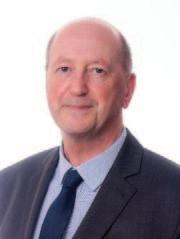
Michael Mooring, Programme Leader BSc (Hons) in Quantity Surveying, Technological University of the Shannon in Limerick Michael began lecturing in Bristol Polytechnic in 1989 after working as a Quantity Surveyor in both the UK and Ireland. Since 2001, he has lectured on construction law and dispute resolution in Limerick. He is due to retire in August 2025.
Michael says the biggest change he has seen over the years has been in the level of student attendance: “At the commencement of my teaching career, student attendance was not an issue. Students were generally funded by their parents or they received a grant. I don’t recall any student having to undertake part-time work to fund their studies … But over the years, I’ve witnessed a growing trend for students to have to self-fund their studies by taking on part-time employment. I believe this has placed additional pressures on students and contributed to lower student attendance numbers”.
Technological and societal changes have also impacted attendance, he says: “During the Covid pandemic, lectures were delivered online, and students realised that they didn’t have to incur travel expenses or accommodation costs to undertake their studies. That, together with the availability of online study material, has meant that the traditional faceto-face lecture/tutorial format is no longer attractive for students”.
There has also been a shift in the attitudes of some students. At the start of Michael’s academic career students were encouraged to ‘read’ for their degree. Today however getting students to read is much more difficult. In Michael’s view students tend to focus on only what is necessary: “They’ve become very mercenary. They’re very assessment focused: ‘Tell me what I have to do to pass this’, and that’s it”.
In recent years, the likes of ChatGPT are affecting coursework assignments: “A written report is considered an uncontrolled assessment, whereas examinations or student presentations would be controlled assessment”.
Michael believes that many lecturers want to go back to controlled assessment such as unseen examinations and in-person assessment, but for various practical reasons that’s resisted by the universities. Michael says the surprising change for him is that the established QS courses haven’t changed that much: “The core skills have not changed but the way in which modules are delivered has taken full advantage of developments in IT”.
Analytical skills are crucial for surveying students and graduates, says Michael: “To be able to analyse many sources of data and then present it in a straightforward document that contractors or our clients can understand, is an attractive skill for employers. It is also important that the student is comfortable with numbers and figures, and that they have a good work ethic”.
Michael would like to see more ‘earn-as-you-learn’ routes introduced into surveying: “Such routes offer students a way of gaining practical experience whilst studying for their degree. It also means they can earn money and not have to take on part-time work. An additional benefit for the lecturer is that students bring ‘real-life’ problems into the class for discussion”.
Michael believes the industry is a good one to work in, but that sometimes you need to be willing to relocate in order to remain in employment. Michael has experienced six or seven recessions during his 53-year career as a Quantity Surveyor, but by being willing to travel he has been fortunate enough to remain in full employment through. Overall, Michael is concerned about today’s students: “They never smile. They’re never happy. That might be a generational thing, but they’re all so serious. Whether it’s been Covid that’s caused it or whatever, I don’t know, but they seem to be carrying the troubles of the world on their shoulders. I would like them to enjoy the experience. I know they are addicted to their mobile phones, but if I could offer one piece of advice it is try to stay in the moment and enjoy the journey. Everyone is rushing to either get chartered or to get promoted to a senior position, but it is important to enjoy the journey along the way and to make friends”.
5*S: SPACE, SURVEYORS & STUDENTS IS A COLLABORATIVE PROJECT DEDICATED TO FOSTERING INTEREST IN SPATIAL DATA, SATELLITE TECHNOLOGY, AND GEOSPATIAL SCIENCE AMONG STUDENTS AND TEACHERS.
The geospatial surveying industry thrives on innovation, and its future depends on inspiring and equipping the next generation of professionals. As technology continues to advance, the importance of geospatial science in understanding and solving global challenges has never been greater. By fostering interest in this field among students, we can ensure a steady pipeline of skilled professionals who can contribute to areas such as urban planning, environmental conservation, disaster management, and infrastructure development.
5*S: Space, Surveyors & Students is a collaborative project led by Maynooth University in partnership with Tailte Éireann, TU Dublin, Esri Ireland, and the SCSI. This initiative is dedicated to fostering interest in spatial data, satellite technology, and geospatial science among students and teachers across Ireland. The project is funded by Research Ireland and ESERO Ireland, demonstrating strong institutional support for education and outreach in geospatial disciplines. The project format consists of a series of three workshops designed to bridge the gap between industry expertise and classroom learning by using augmented reality (AR) and ArcGIS. These tools help to teach
Hannah Coombs Education and Membership Engagement Officer, SCSI FEATURE

students about satellites, spatial technology, and geospatial science in an immersive and engaging way, making complex concepts more accessible and exciting.
By organising workshops in schools across Ireland, the project introduces students to the fascinating world of satellites, survey data, and the United Nations Sustainable Development Goals (SDGs). These sessions employ interactive tools, including a specially created AR app and geographic information systems (GIS) storymaps, to provide a practical understanding of how satellite data and geospatial information influence various aspects of daily life. This hands-on approach not only enhances student engagement but also demonstrates how these technologies are used to address pressing global issues, such as climate change, disaster response, and resource management.
The role of GeoMentors
Central to the success of the 5*S programme is the involvement of GeoMentors – industry volunteers who offer their time and expertise in geospatial technology to deliver these workshops. These individuals play a pivotal role in enhancing geography and GIS education by assisting teachers with introducing geographic concepts and geospatial technology to students. Their participation not only enriches the learning experience for students but also fosters a community passionate about geospatial science.

GeoMentors come from various backgrounds within the geospatial industry, including surveying, remote sensing, urban planning, and GIS. Their real-world experience provides students with valuable insights into potential career paths and the skills required to succeed in these fields. By sharing their expertise, GeoMentors help bridge the gap between classroom-based learning and professional practice, making geospatial science more relatable and inspiring for students.
One of the most enjoyable aspects of participating in the 5*S project is the high level of student engagement with the workshops.
Brian Kelly, Innovation Manager with Compass Informatics, found that the students in CBS Naas, where he ran his 5*S workshops, were “genuinely interested” and “fully engaged” with the content and activities.
Brian and his fellow volunteer GeoMentors, including Ciaran Kirk of IMGS, Emma O’Connor and Sumlam Lau of People & Place, and Mícheál Foley of Mallon Technology, have played a vital role in delivering workshops on behalf of the SCSI and the 5*S project. Their commitment to sharing their skills and expertise in geospatial sciences has greatly contributed to the success of this project, helping to educate and engage students.
Collaboration and interaction
One of the key factors to keeping students engaged and interested in the workshops is their
practical and interactive nature. Reflecting on his time with the students of CBS Naas, Brian noted that: “It’s hard to say if the students were very knowledgeable of the content in advance of the sessions as, like all teenagers, they didn’t say a lot in the beginning. Once it got to the practical parts, they became more lively and got up to speed very quickly with the tools. The programme is really well designed from a content point of view but more specifically, from a technical viewpoint. The use of the students’ own devices is key to the success of the sessions. It makes the students feel more a part of everything instead of listening to instruction from an adult all the time”.
For those hesitant about stepping into a classroom, the reassurance of structured training from the SCSI and the project team in Maynooth ensures that GeoMentors receive the necessary support before and during workshop delivery.
Helen Cullen, an experienced geomatics surveyor and research assistant for the 5*S project, co-ordinates training for GeoMentors and teachers, and provides invaluable support and encouragement to all volunteers. This collaboration with an experienced educator such as Helen makes the process far less daunting. When asked about his preparation for the workshops, Brian found it “important to mention that the support received from the 5*S co-ordinators and the teachers is second to none and really helped to ensure the programme ran smoothly and that I didn’t get overwhelmed by the prospect of a room full of rowdy 16-year-olds”.
The 5*S: Space, Surveyors & Students project shows the power of collaboration between industry professionals and teachers in enriching student learning experiences. By integrating cutting-edge technologies into the classroom and providing support for teachers, the project is creating a generation of students who are not only proficient in geospatial

concepts, but who are also inspired to apply these skills to address realworld challenges.
The continued success and expansion of the 5*S: Space, Surveyors & Students project depends on the generosity and expertise of professionals willing to volunteer their time. By becoming a GeoMentor, you will inspire and educate students about the vast opportunities in the geospatial and surveying industries. Involvement in the project will also allow you to enhance your own skills in communication, mentorship, and engagement. It provides an opportunity to give back to the profession and play a role in shaping its future.
When asked if he would recommend volunteering with this project to friends and colleagues in the geospatial industry, Brian commented that he would “definitely recommend that others get involved in the programme. I feel our industry needs a steady stream of qualified people to continue to thrive. Having the opportunity to have a captive audience who are at such an important age is fantastic. Teenagers are easily influenced and if we can nudge them towards a career in geosciences, it will have been a worthwhile exercise”.
I invite you to join our network of trained GeoMentors and match with a school to deliver these fun and engaging workshops. By participating, you’ll not only inspire young minds but also help cultivate a skilled talent pipeline that strengthens the future workforce of the geospatial industry.
Contact hannah@scsi.ie for more information or to express your interest in the project.
Over recent years, the SCSI has continued to expand the number of courses accredited nationally, providing new routes to Chartered membership for graduates in disciplines ranging across property, land and construction. With the recent addition of the Advanced Quantity Surveyor apprenticeship, University of Galway’s MSc in Planning and Development, and TU Dublin’s MSc in Construction Management, the SCSI now accredits 30 courses nationally (Table 1).
The courses accredited include both full-time and part-time undergraduate and postgraduate courses. Atlantic Technological University (ATU) Sligo and Dundalk IT offer fully online courses, while other universities employ similarly innovative delivery mechanisms including inperson, hybrid and ‘earn and learn’ models.
Accreditation is an important process as part of our collaboration with education providers to recognise programmes relevant to a career in surveying and that support routes to professional qualification, requiring input from industry, academia, employers and students. As part of the process, quality assurance, assessment, resources, collaboration with the SCSI, ethical standards, and diversity and inclusion are all examined. Accreditation demonstrates a globally recognised standard of surveying education, as our accreditation policy aligns with the RICS global policy for accreditation, an attractive prospect for students with aspirations to travel during their career.
James Lonergan Director of Education and CPD, SCSI
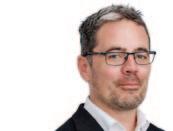
More recently, the SCSI has been working with our academic partners to align our accreditation processes with programme reviews within academic institutes as part of our commitment to Quality and Qualifications Ireland’s (QQI) Principles for Professional Engagements with Education Providers. These principles aim to harmonise separate academic programme validation and professional accreditation/approval processes, removing duplication from processes and reducing administrative burden. More importantly, it ensures that the SCSI is engaged in discussions with academic providers when decisions are being made about the future direction and content of academic programmes, which helps to ensure continued alignment with the competencies required for professionals into the future. While a wealth of opportunities exist for students and professionals to engage in learning through Irish institutions, opportunities also exist further afield. Any RICSaccredited course globally can be used by professionals in Ireland to undertake the APC and work towards gaining Chartered membership. Both Queen’s University and
Table 1: SCSI-accredited third-level courses.
Campus Programme
Atlantic Technological University (ATU) Galway
Atlantic Technological University (ATU) Letterkenny
Atlantic Technological University (ATU) Sligo
Dundalk Institute of Technology
Maynooth University
Munster Technological University (Formerly CIT)
South-East Technological University – Carlow
South-East Technological University – Waterford
Technological University Dublin (Formerly DIT)
Technological University of the Shannon (TUS) – Athlone
Technological University of the Shannon (TUS) – Limerick
BSc (Hons) in Construction & Quantity Surveying and Construction Economics
BSc (Hons) in Quantity Surveying
BSc (Hons) in Quantity Surveying
BSc (Hons) in Construction Project Management & Applied Technology
BSc in Property Services and Facilities Management
BSc (Hons) in Real Estate Development and Valuation
BSc (Hons) in Facilities and Building Services Management
BSc (Hons) in Building Surveying
MSc in Building Surveying
Postgraduate Diploma in Building Surveying
MSc Geographical Information Systems & Remote Sensing
BSc (Hons) in Quantity Surveying
BSc (Hons) in Quantity Surveying
BSc (Hons) in Quantity Surveying
MSc in Construction Project Management
BSc (Hons) in Property Economics
MSc in Real Estate
BSc (Hons) in Geospatial Surveying
MSc in Geographical Information Sciences
MSc in Geospatial Engineering & Data Management
BSc (Hons) in Quantity Surveying & Construction Economics
BSc (Hons) in Construction Management
MSc in Construction Management
MSc in Quantity Surveying
BSc (Hons) in Quantity Surveying
BSc (Hons) in Quantity Surveying
BSc (Hons) in Property Valuation & Management
MSc in Quantity Surveying
Advanced Quantity Surveyor Apprenticeship
University of Galway
Ulster University in Northern Ireland offer a range of courses across property, land and construction disciplines. Similarly, the University College of Estate Management provides a range of online courses in real estate and construction disciplines at undergraduate and postgraduate level, which many in Ireland undertake. This rich and diverse range of routes into the profession is part of the picture in providing a strong future pipeline for our industry. Further future development in apprenticeships also forms part of the picture in providing a highly qualified, talented, diverse pipeline of surveying students.
MA in Planning and Development
“ ACCREDITATION IS AN IMPORTANT PROCESS AS PART OF OUR COLLABORATION WITH EDUCATION PROVIDERS TO RECOGNISE PROGRAMMES RELEVANT TO A CAREER IN SURVEYING AND
THAT SUPPORT ROUTES TO PROFESSIONAL QUALIFICATION, REQUIRING INPUT FROM INDUSTRY, ACADEMIA, EMPLOYERS AND STUDENTS.

On February 13, 2025, the SCSI launched the Adjudication Pupillage Procedure during its third annual alternative dispute resolution (ADR) conference. The Procedure hopes to finally fix the ‘chicken and egg’ experience conundrum that many are faced with in terms of gaining the necessary experience required to progress in the adjudication profession. The Procedure sets out to provide the pupil with a cradle to grave understanding of the adjudication process that includes both watching, understanding and doing.
Adjudication was introduced into the construction industry in Ireland, on a statutory basis, under the Construction Contracts Act 2013 (the Act) to provide a resolution mechanism for dealing with payment disputes. Section 8 of the Act outlines the requirements under the legislation for persons to be selected to be members of the Minister’s Panel of Adjudicators. Section 8(6) of the Act outlines that the description of the persons includes “a registered professional as defined in section 2 of the Building Control Act 2007” This includes both Quantity Surveyors and Building Surveyors.
On May 12, 2021, the then Minister, Damien English TD, appointed the current Panel of Adjudicators under section 8 of the Act, to be chaired by Mr Bernard Gogarty. Under section 8(2)
Keith
Kelliher BSC (Const Econ), Dip Con Tech, Dip Arb, Dip Adj, Dip Insurance, MSCSI, MRICS, FCIArb, AMICE, Accredited Mediator, Accredited Adjudicator
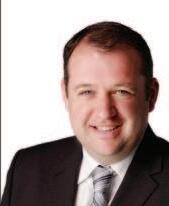
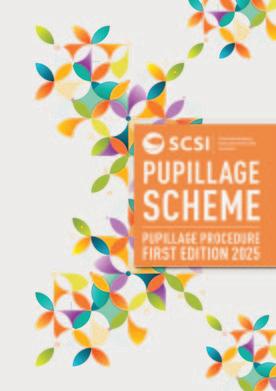
of the Act, the term of appointment for the panel is five years and members can be reselected at the end of the five-year period. The panel is therefore constituted on the basis of a rotating five-year cycle. While those who are on the panel can continue to remain on the panel into the future, it is evident that the end of each cycle provides both an opportunity and also a necessity to attract new members in order to facilitate the availability of experienced decision-makers into the future.
The current Minister’s Panel consists of 34 persons. The current average age of the panel members is just over 61. In addition, only four of the 34 members of the current panel are female. There is therefore a clear and somewhat critical necessity to attract experienced professionals in the process of adjudication to ensure that all future chairs of the Minister’s Panel have available to them a diverse and experienced panel of adjudicators. It is for this reason that the SCSI Adjudication Pupillage Procedure has been launched.
THE PROCEDURE SETS OUT TO PROVIDE THE PUPIL WITH A CRADLE TO GRAVE UNDERSTANDING OF THE ADJUDICATION PROCESS THAT INCLUDES BOTH WATCHING, UNDERSTANDING AND DOING.
The Adjudication Pupillage Procedure focuses on developing the necessary skills, knowledge, and expertise to act as an adjudicator under the Act. The Procedure provides pupils with the opportunity to gain practical experience in adjudication, from gaining a simple understanding of the real-life operation of the process, to understanding and formulating control over the process, through the necessary determinations and judgments, and all the way to writing a reasoned decision. I will set out below how the process will work.
Structure of the scheme
When an adjudicator receives an appointment (through the Minister’s Panel or by agreement of the parties) they will contact the SCSI to request the appointment of a pupil from the pupil register. The adjudicator will require the approval of the parties in the adjudication to appoint a pupil, and any pupil appointed may be required to sign a confidentiality agreement (a sample copy is included in the Procedure). Once a pupil is appointed, they undertake a two-route process of pupillage: Route A and Route B. A pupil must first complete and be signed off from Route A prior to moving on to Route B, and it is hoped that both routes will be carried out under different adjudicators to provide the pupil with experience of different styles of adjudicator.
Route A
Once a pupil is appointed to an adjudicator to undertake Route A, they are copied on all communications in the adjudication process. The Procedure allows for the adjudicator to decide when this occurs and some adjudicators may wish to operate the pupillage in a delayed timeframe to the real process, while others will operate it simultaneously. The purpose of Route A is simply to watch and learn. The pupil will see all that happens, how parties interact, how the adjudicator manages, and how they deal with any and all items that arise. As every adjudication is different the learning experience will differ for every pupil. The purpose of Route A is to provide a clear understanding of the process to the pupil, so they can decide if it is for them or if they wish to learn more. The adjudicator may wish to ask questions of the pupil, such as what they might do next, but overall route
A is just watch and learn. On completion of Route A, the pupil is signed off by notification to the SCSI that they have completed the first step in the process. The pupil is now approved and available to take a Route B appointment if they so choose. One of the benefits of the two-step process is that in certain circumstances, the simple exposure of a pupil to the adjudication process provided under Route A may result in the pupil deciding that the reality of adjudication is not for them. They will therefore simply not proceed to accepting a Route B appointment. For those keen to learn more, the Route B option awaits.
Once a pupil is appointed to an adjudicator to undertake Route B, they are copied on all communications in the adjudication process; however, this will occur on a delayed basis. While Route A is about watching and understanding, Route B is about learning through participation in the process. The adjudicator will ask the pupil to draft the next step in the process at every turn. Once the pupil has drafted and issued the adjudicator with their submission, the adjudicator will provide the pupil with a copy of the actual direction they issued in respect to the issue, and the adjudicator and pupil may engage on anything that arises. This will continue throughout the Procedure with the pupil receiving a communication and drafting what they would do next, followed by a copy of what the adjudicator actually did. In general, the real adjudication may therefore proceed at a period in advance of where the pupil is in the timeline. This will continue up to and including the drafting and issuing to the adjudicator of the pupil’s reasoned decision. Once the decision is received from the pupil, the adjudicator will then share their decision already issued to the parties, with further feedback on the decision and outcomes decided issued to the pupil. The purpose of Route B is participation, in the confined timeline of adjudication, to fully understand the pressure, skillset and technical experience required in the process. On completion of Route B, the pupil is signed off by notification to the SCSI that they have completed the final step in the process. The pupil has now completed the pupillage process and will receive an SCSI certificate of completion. The adjudicator will also have the option to instead suggest that a pupil should retake Route B to gain further experience prior to completing the programme.
The Adjudication Pupillage Procedure is a very practical training programme that, it is hoped, will play a crucial role in developing the next generation of construction adjudicators. It is fully focused on developing the skills and knowledge necessary for the impartial decision-making, information analysis, and effective decision writing that adjudicators require. As such, adjudication pupillage represents an essential step in ensuring that future panels are equipped with skilled, ethical, and experienced adjudicators who can resolve disputes effectively.
The SCSI Pupillage Scheme is open to Associate, Chartered and Fellow members.
For more information, or to apply to the Scheme, please go to https://scsi.ie/scsi-pupillage-scheme-application/
TRANSITION

For over 15 years, DNG has been at the forefront of inspiring young minds to explore careers in real estate through our Transition Year (TY) work experience programme. What started as an in-person initiative evolved into an innovative online programme in 2021, allowing us to reach a much larger number of students from every corner of Ireland. This year, in February 2025, we once again welcomed over 300 students from across the country to take part in our interactive and engaging week-long programme.
Niamh Comber, Partner and Head of Franchising, and I were the hosts of the programme, which provided students with a comprehensive and exciting introduction to the property industry. It combined expert insights, hands-on activities and engaging competitions, ensuring that the students finished the programme with real knowledge of the property industry as a career.
DNG’s TY work experience programme is designed to be more than just a passive learning opportunity. We use polls, live Q&A sessions and interactive competitions to keep students actively engaged throughout the week. One of the highlights each year, which I especially enjoy, is the hosting of a mock auction where we have
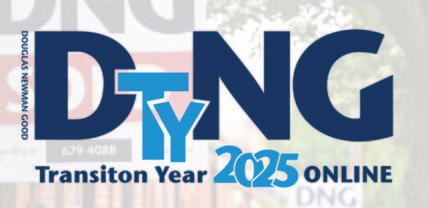
students participating in the programme acting as bidders. Once the students have observed the fast-paced environment of an auction first hand, we invite willing students to conduct an auction themselves, and we have enjoyed watching schools, golf clubs, and even the Phoenix Park being auctioned by the students over the years.
One of the elements of our programme is inviting various colleges who offer property-related courses to also take part, with a lecturer and a student addressing the TY participants. TU Dublin has been a core contributor, with Dr Frank Harrington of the School of Surveying and Construction Innovation and one of his students presenting each year, which has always received incredibly positive feedback. This year’s agenda covered key topics including:
n the role of a property professional – an introduction to what it takes to succeed in the property industry and the different roles involved;
n a day in the life of an estate agent – a second-hand sales agent and a member of our new homes department present on what they do, including how a new homes scheme is handled from start to finish;
n the process of buying and selling – a deep dive into how to buy and sell a property;
Keith Lowe Chief Executive, DNG Group
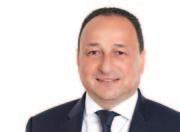
n the process of letting – how a student might go about renting their first property, avoiding scams, what is expected from them as a tenant, and the obligations of a landlord/managing agent;
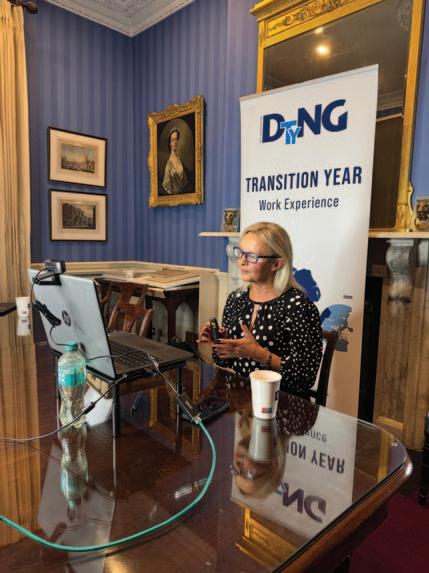
n third-level education – presentation by TU Dublin showcasing property courses and entry paths to thirdlevel courses;
n further education – Ballsbridge College of Further Education presents on its Apprenticeship in Auctioneering and Property Services as an entry option to the property sector; and,
n CV preparation – how to prepare a CV, apply for your first job, and interview techniques.
Throughout the week, students had the opportunity to hear from experienced second-hand and new homes property professionals, valuers, graduate and current apprentices, letting and management specialists, and our customer services team.
We believe that learning is most effective when students are actively involved. That’s why we incorporate interactive elements such as polls, Q&A sessions, quizzes and competitions throughout the programme. Having college students and recent graduates talking to TY students is also very effective.
One of the students’ favourite competitions is the TikTok Challenge, where participants create a fun and informative video related to real estate, with a prize for the best entry.
This year, students also competed in Q&A challenges and quickest answer games, keeping them engaged while reinforcing key concepts.
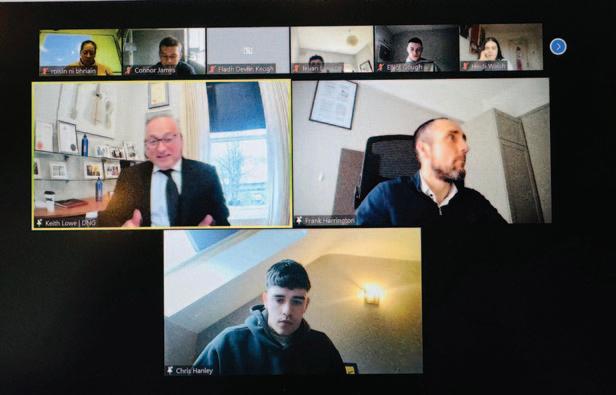
While Niamh Comber and I lead the programme with energy and enthusiasm, the success of the initiative wouldn’t be possible without a dedicated team working behind the scenes. Our IT and administration teams play a crucial role in ensuring that every session runs smoothly, from managing the online platform to coordinating speakers and competitions.
We are also incredibly grateful to the guest speakers who generously share their time and expertise, giving students real-world further insights into the property industry. Their contributions help bring the content to life, showing students the many diverse career opportunities available in real estate.
The impact of our Transition Year programme is incredibly satisfying. Since moving online in 2021, we have reached over 1,500 students, some of whom have gone on to pursue careers in the property sector. Each year we are also joined by full TY classes in schools using whiteboards to interact.
By breaking down barriers and offering access to industry insights regardless of location, we feel we are helping to cultivate the next generation of property professionals. Students from Dublin to Donegal, Cork to Galway and everywhere in between have the opportunity to engage with our presenters, ask questions, and start considering real estate as a viable career path. This year we had TY students from virtually every county in Ireland.
Every year, we refine and improve our programme based on student feedback. The enthusiasm, curiosity, and fresh perspectives that the TY students bring continue to inspire us and help shape the programme, and we remain committed to making the programme even better year on year.
In 2026, we plan to expand the programme even further and are considering more handson activities, additional guest speakers, and new ways to engage students in the evolving world of real estate.
At DNG, we believe in investing in the future of our industry – and that starts with educating and inspiring the young minds of today.
We get satisfaction when we see the high level of students who advise that they have chosen property as career as a direct result of our programme. We have also had several uplifting letters from students with learning difficulties who we have inspired to succeed. For more information on our 2026 TY work experience programme, visit ty.dng.ie or follow us on social media.
Erasmus+ is the EU’s programme to support education, training, youth and sport in Europe. In higher education, it allows for the exchange of students and staff for a period of study and teaching time, respectively. The most recent Erasmus+ programme (2021-2027) has an estimated budget of €26.2bn distributed across the 27 EU states. In Ireland, TU Dublin, along with 30 other organisations across the higher education sector, avail of Erasmus+ opportunities. Between 2017 and 2023 more than 32,500 EU students and 13,293 staff came to Ireland as part of their studies, and more than 9,000 Irish students and 2,179 staff travelled abroad. By promoting and financing the exchange of knowledge and culture through these opportunities, a sense of togetherness and European unity is facilitated.
Erasmus+ in TU Dublin
Participation in the Erasmus+ programme 2021-2027 forms part of TU Dublin’s strategic plan. To support this, all TU Dublin Erasmus+ programmes across its 250 academic partners in 21 countries, are supported by a team of administrative staff in the International Office, whose expertise feeds into smaller teams and groups. In addition, academic schools, including the School of Surveying and Construction Innovation (SSCI), have an individual Erasmus Coordinator responsible for implementing the programmes at grassroots level and liaising with individual participants.
Dr Audrey Martin FSCSI Senior Lecturer Geospatial Surveying & Erasmus Coordinator, School of Surveying and Construction Innovation, TU Dublin
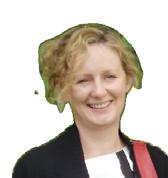
The SSCI in the Bolton Street campus has significantly increased the number of new international institutional agreements (IIAs) since Covid-19 and students in the School currently have the possibility to study in universities in: The Netherlands (Groningen); Germany (Darmstadt and Dresden); Austria (Vienna); Spain (Valencia); France (various locations); Poland (Warsaw); Cyprus (Pafos); and, Turkey (Ankara). In addition to Europe, the SSCI also has similar student/staff exchange partnership agreements with universities in the USA (Purdue) and Australia (RMIT Melbourne), and is finalising a new agreement in Malaysia.
IN HIGHER EDUCATION, ERASMUS ALLOWS FOR THE
OF STUDENTS AND STAFF FOR A PERIOD OF STUDY AND TEACHING TIME, RESPECTIVELY.
The majority of the SSCI IIAs are offered to full-time BSc students, whereby the student spends a full semester abroad as part of their programme of study. Shorter blended intensive programmes (BIPs), which can suit postgraduate students, are also part of the SSCI Erasmus+ portfolio. BIPs allow students to travel and attend specialised one-week training events. Most recently, SSCI students have travelled to the 2025 European Real Estate Market Programme in Vienna and the 2024 Warsaw Summer Geospatial Survey School. Separately, the SCSI has supported geospatial surveying students attending the International Summer Survey School in Italy – although this is outside of the Erasmus+ programme.
Erasmus+ student benefits
A huge benefit of Erasmus+ programmes is that students are not charged tuition fees in the European institution that they attend. However, there may be other charges to pay to the university, and of course there are costs involved in living abroad. Students need to budget for flights, accommodation, food and other expenses. Under the Erasmus+ guidelines, students must also have valid medical and travel insurance. To assist with some of the costs incurred Erasmus+ provides a monthly stipend of between €300 and €350. Where a student is travelling for a traineeship, the grant can be up to €500. In addition, students who receive educational grants (SUSI) may be eligible for a €250 per month top-up.
Visiting international students sit alongside the full-time students daily and engage with all aspects of university life. This is evidenced by the engagement with TU Dublin societies by SSCI Erasmus+ students last semester, when three RMIT students found themselves part of a TU Dublin GAA football team, a sport they had never played before but immensely enjoyed. Additionally, three French students took part in the weekly badminton matches. A current visiting student attending the BSc in Construction Management clearly outlines the personal and academic benefits he has found so far this semester. Magnus Fechler, Construction Management student from Darmstadt, Germany said: “The first half of my Erasmus programme was pretty nice. I met a lot of new people (Erasmus and Irish)…. I was very well received and have already learnt a lot about the current housing situation in Ireland, that safety on site is very important here, which I think is pretty good. Moreover, we do a lot of BIM here at the University, which I think is very good because it’s already being used now but will also become increasingly important in the future”. Through the unique experience of living and studying abroad, students gain self-confidence and soft skills, discover different cultures, and build networks of interpersonal and professional relationships with people from other countries. This fosters their employability and active participation in society, and contributes to greater social inclusion and a strengthened European identity (erasmus-plus.ec.europa.eu) This is strongly evidenced by the current
Property Economics BSc students on their Erasmus+ semester in the University of Neapolis, Pafos, Greece. Anna Chen, Property Economics student at TU Dublin, said: “It is a great experience. We have gotten to know lots of students both from Greece and other international students – there are lots here. The coursework and lectures are not too difficult as we have already covered some of the topics… All our assessments are based on coursework, so no exams….Accommodation can be either on campus or nearby, and we found it ourselves easily, costing about €400-€500 p/m… We are really enjoying the weather and the beaches”.
Erasmus+ future opportunities
The number of Erasmus+ exchanges is increasing year on year as new exchange opportunities are created and promoted, and students recognise an Erasmus+ semester as an integral part of their university experience. Additionally, proficiency in a foreign language, previously a barrier for many Irish students, is less of an issue as many universities across the EU are now delivering BSc and MSc programmes through English. Most importantly for students is that their studies completed at a host institution form an integral component of their qualification, and are fully recognised by all universities through the use of the European Credit Transfer System (ECTS). This harmonises qualifications across the EU and facilitates accessible student and staff exchange, thus meeting an aim of Erasmus+ in promoting European unity.
Did you ever think that you could contribute to this Journal?
Serving as a member of the Editorial Board could be a way for you to make a valuable input to your professional body.
The Surveyors Journal has been published for many years, and judging by the feedback it is appreciated and enjoyed by members of the SCSI. Many of their clients also enjoy reading it. It is worth pointing out that after receiving a parchment on becoming Chartered, it is now the only physical communication a surveyor gets from their professional body. The publication of a periodical is a traditional and necessary part of the work of a professional body. Along with technical and practice papers written by experts, many of whom are members, it provides colleagues with information about the body itself, the activities of sur veyors, and the activities of membership groups working on behalf of the SCSI.
Up to the end of the last century, such publications were the essential medium by which the professional body kept members abreast of developments. They were also a
Tom Dunne Editor NEWS FEATURE

means whereby the profession communicated knowledge to other professionals and wider society.
Nowadays, with modern communication technologies, professionals can be provided with much essential information in a more timely way, more cheaply and in much greater quantity than was possible through a periodical arriving by post. However, in a world where so much information is sent directly to our inbox, a physical publication can command attention if the content is worthwhile. Keeping the content meaningful is where you can make a contribution as a member of the Editorial Board.
The primary role of the members of the Editorial Board is to exercise their professional judgment about the content of the Journal Board members need therefore to understand the profession and be alert to trends and developments in the field of surveying. Through discussions with fellow Board members, your distinct personal and professional experiences help the Board decide the content for the Journal
Clearly, Board members themselves would not have the range of knowledge to write all of the material that forms the content of the Surveyors Journal. Nor could they be aware of all the developments in knowledge and practice needed to keep members informed and up to date. Such information is dispersed
among many members of the profession and practising surveyors are a repository of much wisdom and knowledge. Therefore, your input in recommending topics, and authors, for these articles is crucial. Ideas for content also come from the staff of the Society who interact with active members daily. Professional groups can also be a source of good ideas for articles, while academics also can be a useful source for content. Quite often members and others with an interest in communicating directly to surveyors will offer to write an article.
Typically, the Board meets six times a year for an hour. Meetings are generally held online, although there are plans to have one inperson/hybrid meeting each year. At the meetings, the Board reviews content that has been submitted for consideration, or tries to generate ideas for content based on themes or information from a wide range of sources. The Board is ably supported by publishers Think Media, who have a professional team of journalists to edit and evaluate content. Therefore, while a board member must read proposed content and make judgements about relevance, writing and editorial skills are not crucial. Rather it is awareness of the issues and developments that will allow you to contribute to the success of the Journal
If you are interested in becoming a member of the Editorial Board, please email audrey@scsi.ie
Frank was introduced to the property industry at an early age, growing up in a family estate agency, Smith Harrington in Navan: “I remember helping with furniture auctions, sticking lot numbers on items, and listening to practitioners and clients in the office long before I fully understood what was going on”. He went on to do a Property Economics degree in TU Dublin, and his family experience was helpful to both him and his classmates: “I enjoyed it immensely, not just academically but also through helping classmates understand the real-world applications of what we were learning”.
This aptitude for teaching was noticed, with Tom Dunne (then Head of School) suggesting Frank do a PhD. While going straight to teaching was tempting, Frank wanted to work for a while and having come from a family practice, was eager to see what life was like in a bigger firm, so he joined Lisney: “I worked across several departments, but mostly in development services and research. I was drawn to the intersection of valuation, land use, and planning”.
Frank started a professional doctorate with the University of Salford in 2012: “That doctorate focused on a unique dataset of agricultural land sales and rental figures dating back to
SURVEYOR
PROFILE
Colm Quinn Senior Journalist, Think Media Ltd

1870 from the Smith Harrington archives – over 60,000 entries. I used that to develop discounted cash flow models for valuing agricultural land, and the work later became the foundation of what is now the SCSI/Teagasc Land Market Review and Outlook Report”. Frank says while completing the professional doctorate, a lecturing post came up at DIT: “I applied and was fortunate enough to be offered the role, initially as an assistant lecturer teaching land valuation. I continued some parttime practice at Smith Harrington to stay connected to industry. Between 2016 and 2020, I moved into a full lecturer role and then progressed into academic leadership as the Discipline Lead for Real Estate and Valuation”.
Frank says balancing working as an academic and practising as a surveyor can be demanding: “While teaching full-time, I kept up a small number of valuations to ensure my lectures remained grounded in current practice. However, once I took on the leadership role – formerly Assistant Head of School – it required stepping back from regular practice. It was a conscious decision, and while I still maintain my professional memberships, I now focus on academic development and programme leadership. That said, I continue to take on consultancy work, especially around relevant research and challenging valuations”.
Frank notes that there are many advantages to keeping up a small practice: “Bringing realworld insight into the classroom gives students practical context and deepens their
understanding. From a programme development point of view, it also keeps our curriculum relevant and responsive to the needs of industry”.
Frank loves his work: “Supporting students, helping them through challenges, and watching them grow into confident professionals is one of the most rewarding parts of the job. Yes, there are challenges – particularly around resourcing and the constraints of working in a public sector organisation – but the positives far outweigh them”.
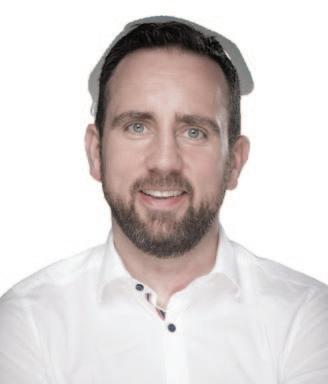
Profile
Outside of work, Frank loves spending time with his wife and two young children. He is also a sport fanatic: “I’m lucky enough to live close to both Tolka Park and Croke Park. Even with a busy schedule, it gives me the opportunity to get to a few games with the kids and with my dad, which is something I really value”.
One of the most rewarding aspects of my role as President is promoting surveying as a career path for school leavers. Alongside young surveyor colleagues, we have already visited over 30 schools, spreading a crucial message: school performance does not define success. In a system overly focused on CAO points, we must challenge this narrow definition of achievement and highlight alternative routes into careers – particularly in industries like surveying, construction, and engineering.
Ireland is facing an acute skills shortage, not only in surveying but across the entire construction sector, including trades such as plumbing, electrical work, bricklaying, and plastering. Addressing the housing crisis means addressing our capacity constraints, and that begins with fostering a stronger, more diverse talent pipeline. The Government must play an active role in incentivising apprenticeship programmes, encouraging more young people to consider careers in property, land, and construction.
The recently announced Strategic Housing Activation Office is a welcome initiative, as
THE LAST WORD
Kevin Hollingsworth SCSI President

increasing housing supply is essential. However, speed without oversight risks repeating past mistakes. Modern construction methods offer a promising way forward, but they require regulation, adaptation, and skilled professionals to implement them effectively. Reinforcing local authority building control departments is essential to ensure rigorous inspections and prevent the failures of the past. Yet, none of this is possible without a properly resourced workforce. The feedback I have received is that when local authority building control departments try to recruit there is a lack of applicants due to the lack of resources.
Apprenticeships provide a critical solution to our growing skills gap, not just for traditional trades but for professional roles like surveyors and engineers. Despite the proven success of initiatives like the Level 6 civil engineering apprenticeship at Atlantic Technological University (ATU), we continue to face challenges in approving new programmes. Quantity surveying, land surveying, and building surveying apprenticeships must be prioritised by all stakeholders, including industry and the National Apprenticeship Office, as these professions are fundamental to solving our current challenges. Beyond workforce shortages, apprenticeships also serve as a powerful tool for social mobility.
I was particularly inspired when I heard a speech delivered by Prof. Katriona O’Sullivan from Maynooth University, who shared her journey from poverty to academic success. Her book Poor underscores a fundamental truth: education provides a path out of hardship. When we discuss equity, diversity, and inclusion (EDI), we must recognise that it extends beyond race and gender – it is about ensuring equal opportunities for all, regardless of socioeconomic background.
Providing the means to succeed
From my experience engaging with secondary school students, it is those from lower-income areas who express the most enthusiasm for apprenticeship opportunities. These programmes offer a viable and respectable career path for students who might not have the financial means to pursue a traditional university degree. The Government must prioritise the expansion of apprenticeships, not only in surveying but across all sectors, to equip Ireland with the skilled workforce it desperately needs while offering real opportunities to those who might otherwise be left behind.
Apprenticeships are more than an alternative to higher education, they are a bridge to prosperity for individuals, and a vital solution to our national skills crisis. It is time to push forward and ensure that these opportunities are accessible to all who seek them.

